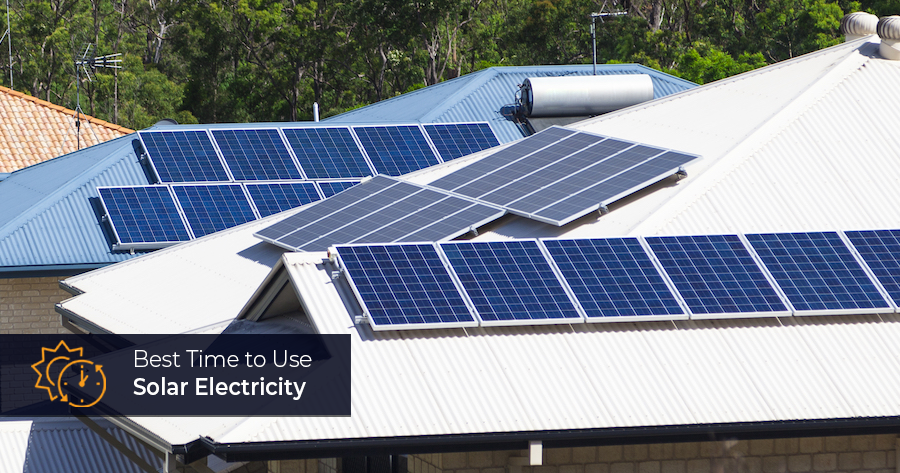Best Time to Use Solar Electricity

Australia is one of the best places in the world to install a solar system, thanks to great weather and a high percentage of clear, sunny days in both summer and winter.
While our generally sunny weather and clear skies means that it makes good sense to install solar panels for your home, you still need to be making the most of your solar by learning when the best time to use your solar electricity is.
The most important factors that determine when it’s right to use your solar energy will depend on where your solar PV system is installed on your roof and where in Australia you live.
Location of solar panels on your roof
- Solar Panels on Eastern Roof
If your solar panels are installed on your eastern roof, it makes sense to use the majority of your solar electricity in the morning. To ensure you make the most of your solar electricity, we recommend using appliances like the dishwasher or washing machine as soon as you get up or turning them on just before you head out the door for the day.
- Solar Panels on Western Roof
If your solar panels have been installed on your home’s western roof, we recommend using your solar electricity in the afternoon where possible. Installing panels on a home’s western roof is the perfect choice for those who either finish work early or those with a large family who come home from school and use multiple appliances like your TV, computers and air conditioner at once.
- Solar Panels on Northern Roof
The sun is at its strongest when it sits north in the sky at midday, which means if you have panels installed on your northern roof, the best time to utilise your solar electricity is anywhere from mid-morning to the afternoon. A north installation is perfect for stay-at-home parents or those who work from home, or alternatively you can set timers on your large appliances like dishwashers and washing machines to start at midday while you are at work.
- Solar Panels on Whole Roof
If you have an even spread of solar panels across your whole roof, then you are able to use your energy at any convenient time throughout the day.
If you live in Western Australia
In WA, the feed-in tariff has recently changed from the REBS to DEBS, meaning that instead of a flat 7c feed-in tariff, the tariff amount changes dependant on the time of day; power exported to the electricity network between 3pm and 9pm generates a 10c per kWh feed-in tariff, while power exported to the electricity network before 3pm generates a 3c per kWh feed-in tariff. With this in mind, it makes much more sense to use as much of your solar-generated power during the daytime before 3pm, so that any additional energy you do not consume after 3pm can feed back into the grid and enable you to receive the higher feed-in tariff rate.
What to remember about solar electricity usage
Just because you have solar panels on your roof, it doesn’t mean you should try and use all your appliances all at once, as that can push your energy requirements above what your solar panels are producing.
While there are certainly optimum times to use your appliances, depending on where your solar panels are located on your roof, you still need to be smart about your usage. For example, wait until your dishwasher has completed its cycle before turning on the washing machine to ensure your demand for power isn’t more than your solar PV system is generating.
If multiple appliances are run at the same time, your home’s electricity usage may exceed the amount of power that your solar PV system is generating, forcing your home to purchase electricity from the grid, which will lead to additional electricity cost.
By staggering your usage, you’ll be able to use more of your solar electricity, therefore offsetting and saving more on your power bills.
We also recommend programming high-usage appliances to turn on during the day when there’s peak sunshine, for example scheduling a pool pump to switch on at midday.
In the summer months, you may wish to set your air conditioner to turn on in the afternoon before you get home, so it has a few hours to cool down your house before you return while your solar PV system is at its peak generation capacity, as opposed to coming home and turning it on in the evening when your solar panels are not generating as much solar power.
Solar & Grid Monitoring
If you have invested in solar and grid monitoring, you can monitor your usage to see when your home is generating excess solar power or an insufficient amount of solar electricity and adjust your usage accordingly. This will help you to control the amount of solar power you needlessly export or buy from the grid, enabling you to save more money on your electricity costs.
For a no-obligation quote on solar for your home, call us on 1300 074 669, or click here to request a call-back from one of our experienced solar energy consultants.


